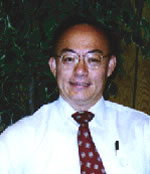 |
Tulane
Engineering Forum
|
|
|
|
|
|
| |
| Opportunities |
| |
| |
| |
| |
Dr. Harold Szu Dr. Harold Szu has received a Ph. D. in Statistical Mechanics from Prof. George Uhlenbeck at the Rockefeller University in 1971, and worked at NRL in Plasma Physics, Optics, & EW over 15 years (1977-1990), and Info Sci Group Leader of NSWC at White Oak (1990-1996). He became Alfred & Helen Lamson Chair Professor of Univ. of Louisiana at Lafayette (1996-1998) and built there the first NASA/GSFC satellite earth station on CACS rooftop. He has established the first foreign endowed Lamson Professorship in Peking Univ. during her Centennial Celebration. He is a honorable professor of Peking University, Tsing-Hua University, Wu-Han Science & Tech University since 1993, and Fudan University since 2000. He has recently established the Digital Media RF Lab, Dept. of ECE, GWU, Washington DC, and is the Director and Research Professor (http://www.student.seas.gwu.edu/~dmlab/), while, during the daytime, he remains working at the Office of Naval Research to define R/D programs. Dr. Szu has been a Champaign of brain-style computing for decades. He is a founder, former president, and a governor of International Neural Network Society (INNS) and contributes to 30 SIG/Chapter worldwide developments. He has been a Fellow of SPIE (1995) for neural nets, Fellow of OSA (1996) for adaptive wavelets, Fellow of IEEE (1997) for bio-sensors. He has been responsible for the recent breakthrough of unsupervised learning of pairs of receivers--being contrast to a dumb PC "garbage in--garbage out", he postulated the thermodynamic free energy for "raw pair inputs, (squeezed out any known) garbage output" (without the need of supervision and what retained must be the unknown information). He is an academician of Russian Academy of Sciences in 1999 for the convergence proof of the homeostasis learning based on constant Cybernetic Temperature.
Besides
300 publications, dozen patents,
numerous books & journals,
Dr. Szu taught students "how
to be creative in sciences",
according to the Royal Dutch
tradition, and guided a dozen
Ph D students, and his own practice
of the creativity is itemized:
Presentation Topic : Intelligent Computing for Smart Information Technology By: Dr. Harold Szu
The power engineering will be synergistically combined with the information science & technology through the recent advent of unsupervised learning methodology of artificial neural networks (ANN). The breakthrough of learning without teacher (relying on "sensor pair coincidence fusions") laid down the mathematical foundation of animal natural intelligence. Such an intelligent computing for multiple sensors fusion is quite useful for the futuristic robots for the energy & environment endeavors. This is timely in meeting the challenge of anti-terrorists with a affordable and comprehensive urban surveillance plan. In the US, where ever there are peoples, there are power-lines and traffic lights etc. To utilize the legacy power engineering infrastructure with a minimum cost, the ONR proposed [1] a Smart Sensor Web power-line communication network without the address that would otherwise require formidable expenditure as if the telephone/power-line were redirected for other usages---called DSL As a result, Digital Media RF Lab of GWU has demonstrated that the legacy electric power line can support N-to-1 broadcasting without address in the cases of smart & binary sensors web (SSW) for a single household/stadium/mall/metro/city surveillance communication need[2]. We have meanwhile demonstrated the smart multi-spectral sensor fusion on satellite platforms for the earth resource management, as well as to the early diagnoses of the angiogenesis phase transition of the breast cancer [3].
|
 |